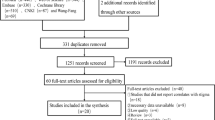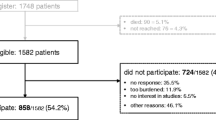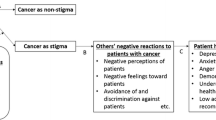Abstract
Objective
The systematic review and meta-analysis was performed to summarize the available evidence and identify the correlates of cancer stigma.
Methods
PubMed, EMBASE, Web of Science, the Cochrane Library, and PsycINFO were electronically searched to identify eligible studies about correlates of stigma for patients with cancer. Two reviewers independently screened the literature, extracted data, and assessed the risk of bias of included studies. A meta-analysis was performed using the statistical program R.
Results
Thirty-one studies involving a total of 7114 patients were included in the systematic review and meta-analysis. The results of the meta-analysis showed that cancer stigma shared positive associations with male gender, symptoms, depression, anxiety, body image loss, self-blame, social constraint, intrusive thoughts, and ambivalence over emotional expression, and negative associations with income, NK cell subsets, QOL, self-esteem, self-efficacy, cancer screening attendance, doctor’s empathy, and medical satisfaction. The results of the descriptive analysis indicated that cancer stigma was positively associated with self-perception of aging, anger, internal attributions, stressful life events, self-perceived burden, and sleep dysfunction, while negatively associated with patient-provider communication and sleep quality.
Conclusion
Healthcare staff should pay attention to the identified correlates of cancer stigma. The results of our research can inform the design of interventions to reduce stigma and to improve clinical outcomes in people with cancer.
Similar content being viewed by others
References
Bray F, Ferlay J, Soerjomataram I, Siegel RL, Torre LA, Jemal A (2018) Global cancer statistics 2018: GLOBOCAN estimates of incidence and mortality worldwide for 36 cancers in 185 countries. CA: a cancer journal for clinicians 68(6):394–424. https://doi.org/10.3322/caac.21492
Meacham E, Orem J, Nakigudde G, Zujewski JA, Rao D (2016) Exploring stigma as a barrier to cancer service engagement with breast cancer survivors in Kampala, Uganda. Psychooncology 25(10):1206–1211. https://doi.org/10.1002/pon.4215
Carter-Harris L, Hermann CP, Schreiber J, Weaver MT, Rawl SM (2014) Lung cancer stigma predicts timing of medical help-seeking behavior. Oncol Nurs Forum 41(3):E203–E210. https://doi.org/10.1188/14.Onf.E203-e210
Quinn DM, Chaudoir SR (2009) Living with a concealable stigmatized identity: the impact of anticipated stigma, centrality, salience, and cultural stigma on psychological distress and health. J Pers Soc Psychol 97(4):634–651. https://doi.org/10.1037/a0015815
Cvetkovic J, Nenadovic M (2016) Depression in breast cancer patients. Psychiatry Res 240:343–347. https://doi.org/10.1016/j.psychres.2016.04.048
Knapp S, Marziliano A, Moyer A (2014) Identity threat and stigma in cancer patients. Health Psychol Open 1(1):2055102914552281. https://doi.org/10.1177/2055102914552281
Hamann HA, Pujol JL (2018) Introduction to the special section: the experience and impact of lung cancer stigma. J Thorac Oncol 13(8):1053–1054. https://doi.org/10.1016/j.jtho.2018.06.006
Yuan JM, Zhang JE, Zheng MC, Bu XQ (2018) Stigma and its influencing factors among Chinese patients with stoma. Psychooncology 27(6):1565–1571. https://doi.org/10.1002/pon.4695
Cho J, Choi EK, Kim SY, Shin DW, Cho BL, Kim CH, Koh DH, Guallar E, Bardwell WA, Park JH (2013) Association between cancer stigma and depression among cancer survivors: a nationwide survey in Korea. Psychooncology 22(10):2372–2378. https://doi.org/10.1002/pon.3302
Ernst J, Mehnert A, Dietz A, Hornemann B, Esser P (2017) Perceived stigmatization and its impact on quality of life - results from a large register-based study including breast, colon, prostate and lung cancer patients. BMC cancer 17(1):741. https://doi.org/10.1186/s12885-017-3742-2
Phelan SM, Griffin JM, Jackson GL, Zafar SY, Hellerstedt W, Stahre M, Nelson D, Zullig LL, Burgess DJ, van Ryn M (2013) Stigma, perceived blame, self-blame, and depressive symptoms in men with colorectal cancer. Psychooncology 22(1):65–73. https://doi.org/10.1002/pon.2048
Yilmaz M, Dissiz G, Usluoglu AK, Iriz S, Demir F, Alacacioglu A (2020) Cancer-related stigma and depression in cancer patients in a middle-income country. Asia Pac J Oncol Nurs 7(1):95–102. https://doi.org/10.4103/apjon.apjon_45_19
Webb LA, McDonnell KK, Adams SA, Davis RE, Felder TM (2019) Exploring stigma among lung cancer survivors: a scoping literature review. Oncol Nurs Forum 46(4):402–418. https://doi.org/10.1188/19.Onf.402-418
Rose S, Kelly B, Boyes A, Cox M, Palazzi K, Paul C (2018) Impact of perceived stigma in people newly diagnosed with lung cancer: a cross-sectional analysis. Oncol Nurs Forum 45(6):737–747. https://doi.org/10.1188/18.Onf.737-747
Criswell KR, Owen JE, Thornton AA, Stanton AL (2016) Personal responsibility, regret, and medical stigma among individuals living with lung cancer. J Behav Med 39(2):241–253. https://doi.org/10.1007/s10865-015-9686-6
Kim MJ, Moon S, Oh BC, Jung D, Ji K, Choi K, Park YJ (2018) Association between perfluoroalkyl substances exposure and thyroid function in adults: a meta-analysis. PloS one 13(5):e0197244. https://doi.org/10.1371/journal.pone.0197244
Zhao X, Wang H, Li J, Shan Z, Teng W, Teng X (2015) The correlation between polybrominated diphenyl ethers (PBDEs) and thyroid hormones in the general population: a meta-analysis. PloS one 10(5):e0126989. https://doi.org/10.1371/journal.pone.0126989
Peterson RA, Brown SP (2005) On the use of beta coefficients in meta-analysis. J Appl Psychol 90(1):175–181. https://doi.org/10.1037/0021-9010.90.1.175
Cohen J (1988) Statistical power analysis for the behavioral sciences, 2nd edn. Lawrence Erlbaum Associates, Publishers, Hillsdale
Rosenthal R (1994) Parametric measures of effect size. In: The handbook of research synthesis. Russell Sage Foundation, New York, pp 231–244
Else-Quest NM, LoConte NK, Schiller JH, Hyde JS (2009) Perceived stigma, self-blame, and adjustment among lung, breast and prostate cancer patients. Psychology & health 24(8):949–964. https://doi.org/10.1080/08870440802074664
Cataldo JK, Jahan TM, Pongquan VL (2012) Lung cancer stigma, depression, and quality of life among ever and never smokers. European journal of oncology nursing : the official journal of European Oncology Nursing Society 16(3):264–269. https://doi.org/10.1016/j.ejon.2011.06.008
Gonzalez BD, Jacobsen PB (2012) Depression in lung cancer patients: the role of perceived stigma. Psychooncology 21(3):239–246. https://doi.org/10.1002/pon.1882
Cataldo JK, Brodsky JL (2013) Lung cancer stigma, anxiety, depression and symptom severity. Oncology 85(1):33–40. https://doi.org/10.1159/000350834
Hamilton JB, Deal AM, Moore AD, Best NC, Galbraith KV, Muss H (2013) Psychosocial predictors of depression among older African American patients with cancer. Oncol Nurs Forum 40(4):394–402. https://doi.org/10.1188/13.Onf.394-402
Lebel S, Castonguay M, Mackness G, Irish J, Bezjak A, Devins GM (2013) The psychosocial impact of stigma in people with head and neck or lung cancer. Psychooncology 22(1):140–152. https://doi.org/10.1002/pon.2063
Anderson NH, Schofield P, Aranda S, Chambers S, Krishnasamy M, Ball D, Michael M, Kenny P, Lipson-Smith R, Stubbins I, Ugalde A (2014) Social constraint amongst people with advanced cancer: a correlate with stigmatisation and anxiety. Asia-Pacific Journal of Clinical Oncology 10:128–264. https://doi.org/10.1111/ajco.12332
Brown Johnson CG, Brodsky JL, Cataldo JK (2014) Lung cancer stigma, anxiety, depression, and quality of life. Journal of psychosocial oncology 32(1):59–73. https://doi.org/10.1080/07347332.2013.855963
Ahmed R, Tripathy L, Datta SS, Agrawal S, Chatterjee S (2015) Correlates of body image difficulties following breast cancer surgery. European Journal of Surgical Oncology 41(6):S38. https://doi.org/10.1016/j.ejso.2015.03.079
Shen MJ, Coups EJ, Li Y, Holland JC, Hamann HA, Ostroff JS (2015) The role of posttraumatic growth and timing of quitting smoking as moderators of the relationship between stigma and psychological distress among lung cancer survivors who are former smokers. Psychooncology 24(6):683–690. https://doi.org/10.1002/pon.3711
Lebel S, Payne AYM, Mah K, Irish J, Rodin G, Devins GM (2016) Do stigma and its psychosocial impact differ between Asian-born Chinese immigrants and Western-born Caucasians with head and neck cancer? Psychology Health & Medicine 21(5):583–592. https://doi.org/10.1080/13548506.2016.1139138
Shen MJ, Hamann HA, Thomas AJ, Ostroff JS (2016) Association between patient-provider communication and lung cancer stigma. Supportive care in cancer : official journal of the Multinational Association of Supportive Care in Cancer 24(5):2093–2099. https://doi.org/10.1007/s00520-015-3014-0
Maguire R, Lewis L, McPhelim J, Cataldo J, Milroy R, Woods K, Perham M (2017) The relationship between lung cancer stigma and patient reported outcomes. Journal of Thoracic Oncology 12(1):S300
Schroyen S, Marquet M, Jerusalem G, Dardenne B, Van den Akker M, Buntinx F, Adam S, Missotten P (2017) The link between self-perceptions of aging, cancer view and physical and mental health of older people with cancer: a cross-sectional study. J Geriatr Oncol 8(1):64–68. https://doi.org/10.1016/j.jgo.2016.09.001
Tripathi L, Datta SS, Agrawal SK, Chatterjee S, Ahmed R (2017) Stigma perceived by women following surgery for breast cancer. Indian J Med Paediatr Oncol 38(2):146–152. https://doi.org/10.4103/ijmpo.ijmpo_74_16
Weiss J, Yang H, Weiss S, Rigney M, Copeland A, King JC, Deal AM (2017) Stigma, self-blame, and satisfaction with care among patients with lung cancer. Journal of psychosocial oncology 35(2):166–179. https://doi.org/10.1080/07347332.2016.1228095
Hasan Shiri F, Mohtashami J, Nasiri M, Manoochehri H, Rohani C (2018) Stigma and related factors in Iranian people with cancer. Asian Pacific journal of cancer prevention : APJCP 19(8):2285–2290. https://doi.org/10.22034/apjcp.2018.19.8.2285
Yang N, Cao Y, Li X, Li S, Yan H, Geng Q (2018) Mediating effects of patients’ stigma and self-efficacy on relationships between doctors’ empathy abilities and patients’ cellular immunity in male breast cancer patients. Medical science monitor : international medical journal of experimental and clinical research 24:3978–3986. https://doi.org/10.12659/msm.910794
Yang NX, Xiao H, Wang W, Li SY, Yan H, Wang YF (2018) Effects of doctors’ empathy abilities on the cellular immunity of patients with advanced prostate cancer treated by orchiectomy: the mediating role of patients’ stigma, self-efficacy, and anxiety. Patient preference and adherence 12:1305–1314. https://doi.org/10.2147/ppa.S166460
Tsai W, Lu Q (2019) Ambivalence over emotional expression and intrusive thoughts as moderators of the link between self-stigma and depressive symptoms among Chinese American breast cancer survivors. J Behav Med 42(3):452–460. https://doi.org/10.1007/s10865-018-9996-6
Tsai W, Wu IHC, Lu Q (2019) Acculturation and quality of life among Chinese American breast cancer survivors: the mediating role of self-stigma, ambivalence over emotion expression, and intrusive thoughts. Psychooncology 28(5):1063–1070. https://doi.org/10.1002/pon.5053
Vrinten C, Gallagher A, Waller J, Marlow LAV (2019) Cancer stigma and cancer screening attendance: a population based survey in England. BMC cancer 19(1):566. https://doi.org/10.1186/s12885-019-5787-x
Wong CCY, Pan-Weisz BM, Pan-Weisz TM, Yeung NCY, Mak WWS, Lu Q (2019) Self-stigma predicts lower quality of life in Chinese American breast cancer survivors: exploring the mediating role of intrusive thoughts and posttraumatic growth. Quality of life research : an international journal of quality of life aspects of treatment, care and rehabilitation 28(10):2753–2760. https://doi.org/10.1007/s11136-019-02213-w
Wu IHC, Tsai W, McNeill LH, Lu Q (2019) The associations of self-stigma, social constraints, and sleep among Chinese American breast cancer survivors. Supportive care in cancer : official journal of the Multinational Association of Supportive Care in Cancer. 28:3935–3944. https://doi.org/10.1007/s00520-019-05233-x
Yeung NCY, Lu Q, Mak WWS (2019) Self-perceived burden mediates the relationship between self-stigma and quality of life among Chinese American breast cancer survivors. Supportive care in cancer : official journal of the Multinational Association of Supportive Care in Cancer 27(9):3337–3345. https://doi.org/10.1007/s00520-018-4630-2
Liu XH, Zhong JD, Zhang JE, Cheng Y, Bu XQ (2020) Stigma and its correlates in people living with lung cancer: a cross-sectional study from China. Psychooncology 29(2):287–293. https://doi.org/10.1002/pon.5245
Schroyen S, Missotten P, Jerusalem G, Van den Akker M, Buntinx F, Adam S (2017) Association between self-perception of aging, view of cancer and health of older patients in oncology: a one-year longitudinal study. BMC cancer 17(1):614. https://doi.org/10.1186/s12885-017-3607-8
Williamson TJ, Choi AK, Kim JC, Garon EB, Shapiro JR, Irwin MR, Goldman JW, Bornyazan K, Carroll JM, Stanton AL (2018) A longitudinal investigation of internalized stigma, constrained disclosure, and quality of life across 12 weeks in lung cancer patients on active oncologic treatment. J Thorac Oncol 13(9):1284–1293. https://doi.org/10.1016/j.jtho.2018.06.018
Author information
Authors and Affiliations
Contributions
All four authors conceived and designed the review, collected, and interpreted the data and drafted the manuscript.
Corresponding author
Ethics declarations
Conflict of interest
The authors declare that they have no conflict of interest.
Ethical approval
Not required.
Additional information
Publisher’s note
Springer Nature remains neutral with regard to jurisdictional claims in published maps and institutional affiliations.
Electronic supplementary material
ESM 1
(DOCX 24400 kb)
Rights and permissions
About this article
Cite this article
Huang, Z., Yu, T., Wu, S. et al. Correlates of stigma for patients with cancer: a systematic review and meta-analysis. Support Care Cancer 29, 1195–1203 (2021). https://doi.org/10.1007/s00520-020-05780-8
Received:
Accepted:
Published:
Issue Date:
DOI: https://doi.org/10.1007/s00520-020-05780-8




